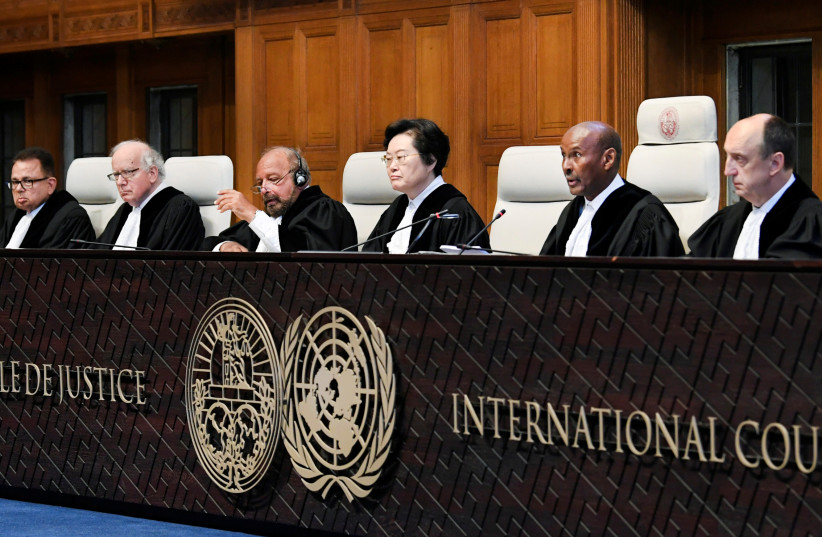Anticipation high as ICJ set to deliver Gaza war ruling tomorrow
THE HAGUE, Netherlands – Tensions are high ahead of Friday’s expected International Court of Justice ruling in the Hague at 1:00 p.m. local time, on the complaint submitted by South Africa accusing the Jewish state of carrying out genocide in Gaza.
The court is expected to decide whether to issue provisional measures ordering Israel to end its military actions in Gaza.
It could also insist that Israel must halt any actions that force population displacement or instruct it to enable the free entry of humanitarian aid into Gaza.
A representative of Israel’s embassy in the Hague will be present at the Court for the publication of the ruling, and at least one representative of the Israeli legal team.
Speaking with reporters on Thursday, Israeli government spokesperson Eylon Levy said, “We expect the ICJ to throw out these spurious and specious charges.”

ICJ likely to issue an intermediate ruling against Israel
Israeli officials, however, told The Jerusalem Post in recent days that the Court is likely to issue an intermediate ruling against Israel, though perhaps a softer version, that would not grant South Africa everything it seeks.
The ICJ is not obliged to adopt South Africa’s provisional measures’ demand. It could opt for its own rephrasing. For instance, it could demand that Israel increase humanitarian access to Gaza, It could ask Israel to refrain from any actions that could in the future be viewed as genocidal, or it could simply urge Israel to act according to international law while expressing its concerns over past actions.
More so, the provisional measures do not depend in any way on South Africa, proving that Israel committed genocidal acts. In other words, even if the judges estimate that at the end of the long process, South Africa has failed to prove this allegation, they could still opt for some sort of provisional measures today.
The issuance of a ruling on the genocide charge could take many months, perhaps even years of deliberations.
In Washington on Thursday, US State Department Deputy Spokesperson Vedant Patel said, “We believe the allegations that started this process, that Israel is committing genocide” is “unfounded.”
He stressed, however, that the Biden administration “will continue to raise the moral and strategic imperative” of minimizing civilian deaths in the war.
Prime Minister Benjamin Netanyahu did not directly address the anticipated ICJ ruling, but he visited soldiers in southern Israel and vowed to destroy Hamas.
In honor of the Tu Bishvat holiday, which celebrates trees, he planted a sapling to signify his determination that Israel would grow strong in that region.
“Hamas came to uproot us; we will uproot them. Hamas came to wipe us out; we will wipe them out. We will deepen our roots in our land, and we will uproot our enemies. We will be here, and they will not be there,” Netanyahu stated.
Who is ruling on the genocide charges – and how?
The South African complaint was submitted on December 29. Hearings took place in the Hague on January 11, when South Africa presented its case, and on January 12, when Israel defended itself against it. Each country appointed an ad hoc judge that joined the 15-justices panel of the ICJ. Jerusalem picked former High Court president justice Aharon Barak to be its person on the panel.
The three-hour presentation by the South African team included pictures and videos showing mass graves in Gaza and Israeli bombing. They also cited Israeli politicians, IDF commanders and soldiers allegedly making inflammatory statements calling for or supporting genocidal acts or policies.
The Israeli team pointed out that the country was engaged in considerable efforts for humanitarian assistance to enter Gaza, an approach contradictory to the South African delegations. The New York Times published on Thursday that in parallel to the January 12 presentation, Israel submitted to the ICJ more than 30 declassified files. These include secret cabinet meetings, resolutions, and orders by military commanders. Israel reportedly argues that these declassified documents rebut the allegation that it committed genocide in Gaza, showing instead its efforts to diminish the number of civilian casualties in the Strip.
What will happen if ICJ rules against Israel?
The ICJ has no means to force Israel to stop the fighting in Gaza. But if indeed it issues provisional measures against Israel, the UN Security Council could follow up on it with a proposal to sanction Israel in some way. Then, it will be up to the United States to use its veto right to block any such proposal.
Former Ambassador and Foreign Ministry Spokesperson Yigal Palmor told the Jerusalem Post that “whatever the decision is, South Africa has already achieved its main, half-confessed objective, namely casting aspersions on Israel and imprinting an ugly stain on its reputation by merely associating it, through worldwide headlines, with a heinous crime.’’
Palmor added that a decision by the ICJ to order a unilateral – though unenforceable – ceasefire ‘’could bolster the enterprise of demonizing Israel.’’ He added that even if eventually the Court refrains from all actions, the damage to Israel’s international image and standing





Comments are closed.